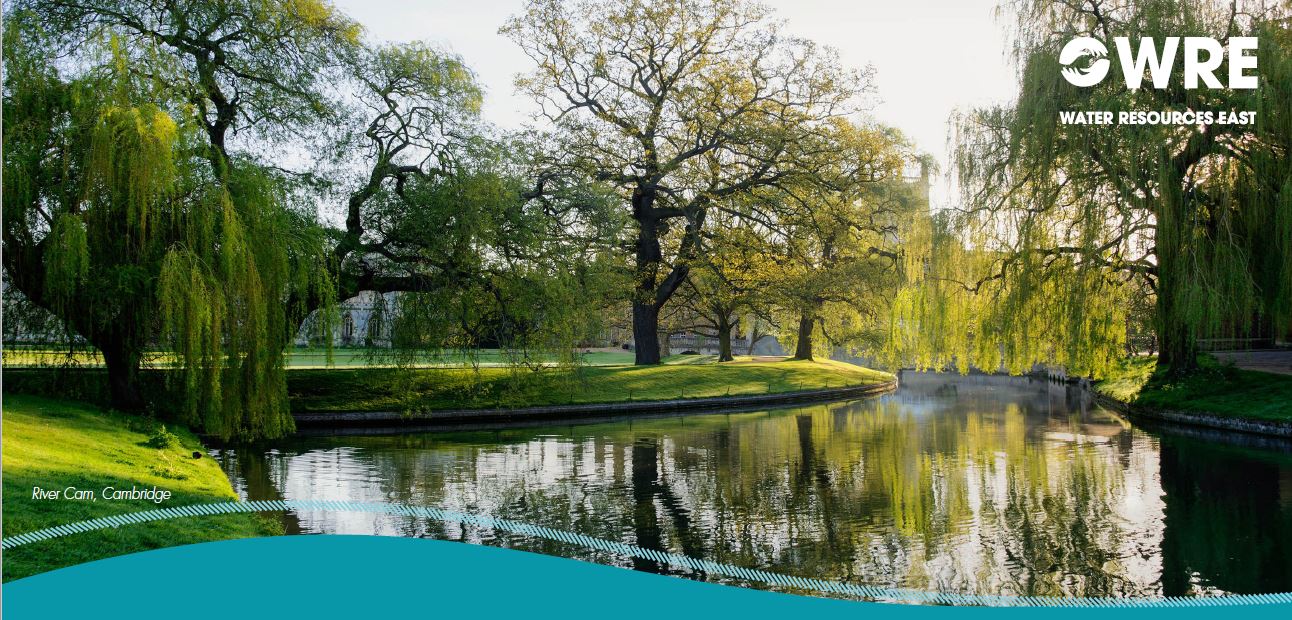Water Resources East’s first regional Water Resources Plan is launched
Posted: 11 November 2022
 £6 billion plan launched to counter serious threat to water security and the environment in Eastern England.
£6 billion plan launched to counter serious threat to water security and the environment in Eastern England.
Urgent action is needed by all water users to manage Eastern England’s scarce water resources. This is the conclusion of Water Resources East’s first ever Regional Water Resources Plan – a multi-sector, collaborative effort to achieve resilient water supplies and a thriving natural environment in the region.
WRE’s Regional Water Resources Plan, published in draft for consultation, reveals that the region faces projected water shortages of more than 600 million litres of water per day by 2050, equating to a quarter of current water use.
This water deficit is being driven by population and economic growth, climate change, and the urgent need to take far less water from rivers and groundwater sources that are showing the effects of over-abstraction.
Unless action is taken, increasing water scarcity will constrain agricultural production and curtail economic and housing development, impacting the region’s future prosperity and endangering the east’s iconic chalk rivers, peatlands and wetlands.
- Water companies and farm businesses in some parts of the east may have to reduce their abstraction of water from current sources by more than 60% in order to help nature recover.
- Farmers and land managers, businesses, the power sector and water companies all need to start planning for and investing in significant new sources of water to support their plans for growth and replace the licenced abstraction volumes they will no longer be able to access as licences are reviewed and in some cases revoked.
- All households, public buildings, businesses and other sectors will also need to use water much more efficiently to conserve the region’s precious water resources.
- The government needs to accelerate new policy to reduce water consumption, including tighter building regulations for water efficient new homes and the proposed mandatory water efficiency label on white goods, taps, toilets and showers.
- Reducing water consumption by rolling out smart metering and bringing leakage down to record low levels. Water companies in the east already have industry-leading leakage performance but there is scope to go further as part of a sector-wide commitment to halve leakage by 2050. Households will on average need to use 20% less water per person than they do today, supported by universal metering, behaviour change campaigns, and new water efficiency policies from government.
- Building two major new reservoir systems in South Lincolnshire and the Cambridgeshire Fens. Between them, these new reservoirs will deliver significant community and environmental benefits as well as storing 100 billion litres of water. Initial public consultations on the proposed reservoir sites have already been launched, but even to an accelerated timetable the reservoirs won’t come into supply until the mid to late 2030s. A new winter storage reservoir in North Suffolk is also likely to be needed.
- In the interim, water companies will need to move more water from wetter to drier parts of the region, upgrade their water treatment capacity, and start to recycle treated wastewater for potable use. A new £300 million strategic pipeline to move water around the region is already being built, which will form the backbone for future supply options.
- In the longer-term, subject to progress on demand management and other factors such as the pace of climate change, the region will likely need desalination plants on the coasts of Lincolnshire, Norfolk, Suffolk and Essex. Whilst an energy intensive process, only desalination offers the potential to bridge the remaining supply-demand gap due to the lack of other viable options in the region.

“I’m delighted to launch WRE’s first-ever Regional Water Resources Plan for consultation. The east is a major crop growing region as well as experiencing high levels of economic and housing development. It is therefore crucial to secure sufficient water resources to support regional growth and the need to restore, protect and improve the natural environment.
“High ambitions for environmental restoration, protection and improvement are at the heart of the plan. Too much water is being abstracted unsustainably from sources such as chalk streams and groundwater aquifers and this needs to change. Our plan shows how 500 million litres of water per day can be returned to the environment, thereby benefitting nature, whilst achieving greater resilience in water supplies for businesses and the growing population. Doing so will help restore the environmental condition of rivers, despite the changing climate, if other pressures on the natural environment are addressed at the same time.
“The plan has been developed through detailed engagement with WRE’s members and other stakeholders over several years. Not just water companies but others including environmental groups, government regulators, local councils, internal drainage boards and representatives of the farming and energy sectors. That is its strength. It doesn’t have all the answers for every sector, but it lays the foundations for more detailed conversations to take place over the months ahead.
“By developing a portfolio of new strategic water sources, as well as transfers, smaller options and pushing as hard as possible on reducing water demand, our plan shows how to achieve sustainable and resilient water supplies across Eastern England for many decades to come.”
WRE’s independent chair, Dr Paul Leinster.
WRE’s draft Regional Plan
Find out more about WRE’s draft Regional Plan and how to respond to the consultation.
The consultation opened on 14 November 2022 and closes on 20 February 2023. Responses will be used to develop the final Regional Plan, to be published in autumn 2023.
Posted: 14 November 2022

